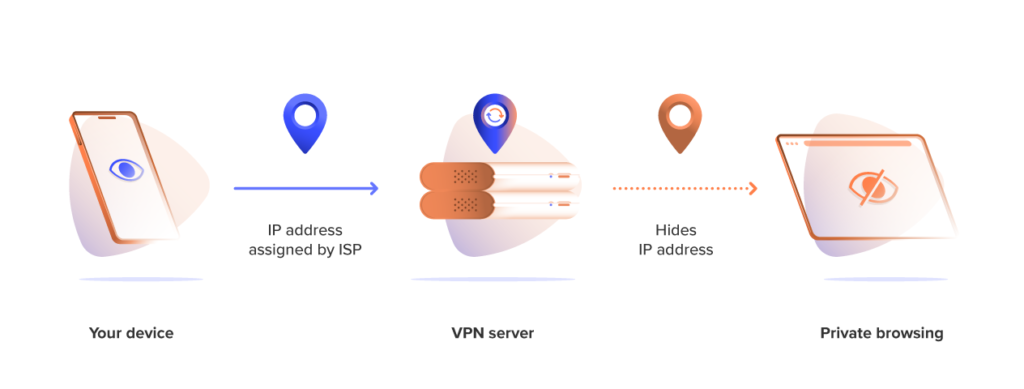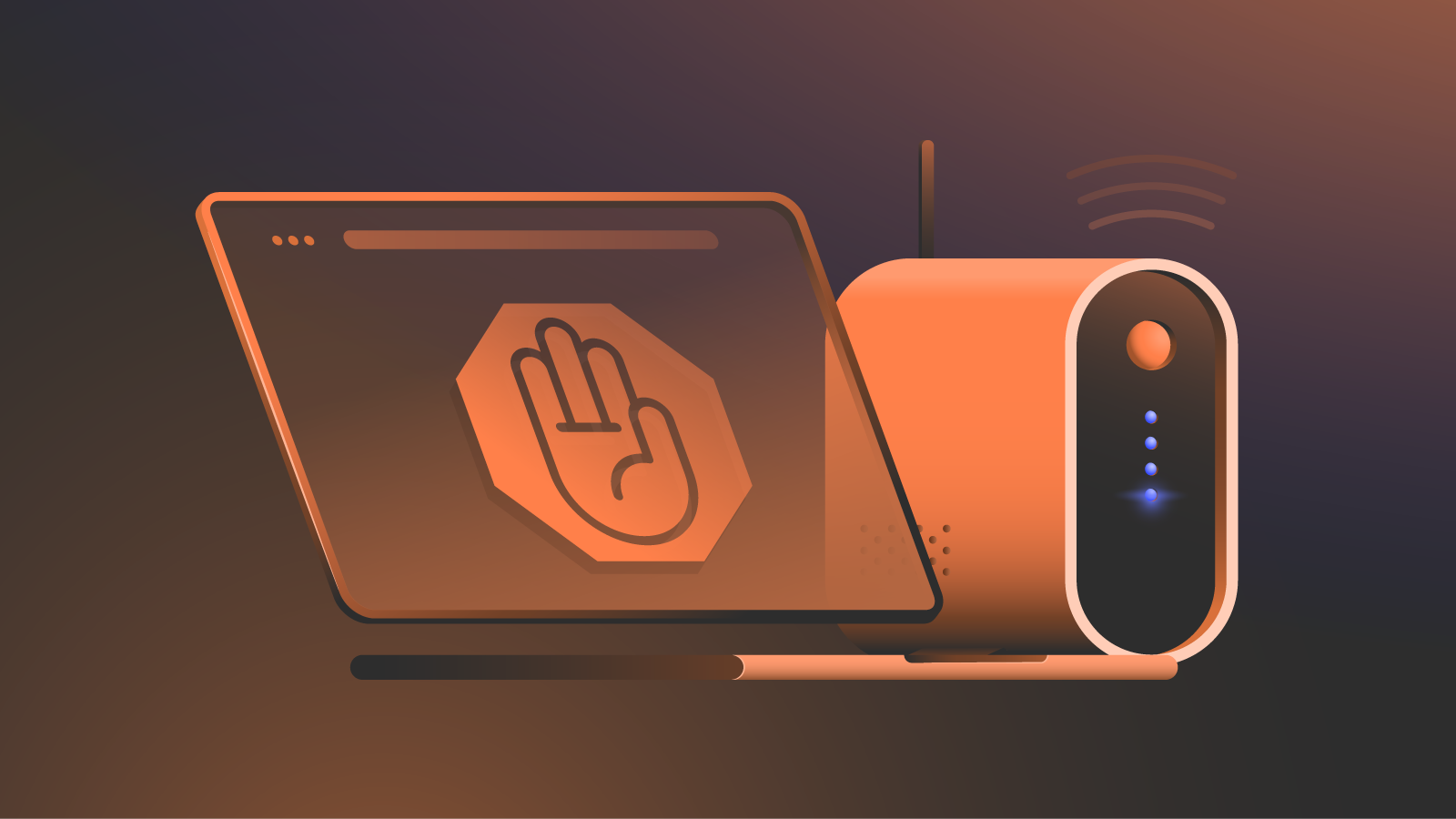
A Virtual Private Network (VPN) changes your IP address by routing traffic through a VPN server. This masks your real IP, making it appear you’re browsing from another location while protecting your privacy and helping you bypass geo-restrictions.
Let’s say you connect to public Wi-Fi at your local coffee shop. Your laptop shows your connection is secure, but websites can still see your real IP address — essentially your digital home address. This exposes your location, your internet service provider (ISP), and creates a trail of your online activities that anyone can follow.
But when you activate a VPN, something remarkable happens: your IP address completely changes. Suddenly, websites think you’re browsing from an entirely different city, country, or even continent. Understanding how this IP address transformation works isn’t just a technical curiosity — it’s essential for protecting your privacy and taking control of your internet experience.
How a VPN works and protects your IP address
A VPN works by creating an encrypted tunnel between your device and a VPN server, routing all your traffic through this server. This process replaces your IP address with a virtual one, hiding your location and protecting your privacy.
When you connect to the internet without a VPN, your device communicates directly with websites using your real IP address assigned by your ISP. This IP address reveals your approximate location and can be used to track your online activities. A VPN changes this process.
A VPN creates an encrypted connection between your device and a remote VPN server. Instead of connecting directly to websites, your internet traffic first travels through this secure tunnel to the VPN server.
The VPN server then forwards your requests to the intended website, but crucially, it uses its own IP address rather than yours. The site or service sees the IP of the server, not you — so while you may be browsing from London on vacation, the site believes you’re back home in Los Angeles (Technology Review, 2020).
This process involves both changing and masking your IP address:
- Changing: Your visible IP address literally changes from your ISP-assigned address to the VPN server’s address.
- Masking: Your real IP address becomes hidden behind the VPN server, making it invisible to websites and online services.
A VPN encrypts all data before it ever leaves your device, so even though your ISP can see that you’re communicating, it cannot see the contents of those communications (Comparitech, 2025).
Myth: VPNs make you completely anonymous online.
Reality: While VPNs provide strong privacy protection, no tool can grant full anonymity. VPNs encrypt your data and hide your IP address, granting you extra protection against trackers, but other methods like browser fingerprinting can still potentially identify you (TechRepublic, 2024).

Does using a VPN change your IP address?
A VPN changes your IP address every time you connect, replacing your real IP with one from the VPN server’s pool, which can be from any location worldwide where the VPN provider has servers.
When you connect to a VPN, it assigns you an IP address that can change periodically. This process happens automatically and instantly. Your device has a private IP that remains hidden, while your router uses a public IP to connect to the internet.
The VPN replaces this public IP address with one from its server network (Security.org, 2025).
The type of IP address you receive depends on your VPN service:
- Dynamic IP addresses: Most VPNs provide dynamic IP addresses by default. Each time you connect to the VPN, you’re likely to get a new IP address — even if you connect to the same server again (MyVPN Online, 2024).
- Static/dedicated IP addresses: Some VPN providers offer static IPs that remain the same every connection, providing consistency for specific use cases.
How VPNs change your IP address:
The step-by-step process of IP address change happens seamlessly:
- Initial connection: When you launch your VPN app and click connect, your device establishes an encrypted connection to the VPN server.
- Authentication: The VPN server verifies your credentials and accepts your connection.
- IP assignment: The server assigns you an available IP address from its pool. With dynamic IP assignment, each time a user connects to the VPN, they’re given a different IP address from a pool of addresses available to the VPN provider (MyVPN Online, 2024).
- Traffic routing: All your internet traffic now routes through the VPN server using this new IP address.
- Website interaction: When you visit a site, it sees the VPN server’s IP address, not your real one.
- Return traffic: The site sends data back to the VPN server’s IP, which then forwards it to you through the encrypted tunnel.
This process typically takes just seconds, but the protection it provides lasts for your entire session. Your real IP address remains completely hidden throughout your connection.
[Illustration – process of how VPN changes IP]
Does a VPN change the IP address every time?
Whether a VPN changes your IP address every time depends on the type of service — dynamic IPs change with each connection or server switch, while static/dedicated IPs remain constant.
The frequency of IP address changes depends on your VPN configuration and provider policies. Understanding this helps you choose the right setup for your needs.
With standard VPN services using dynamic IP assignment, your IP address changes in several scenarios:
- Each new connection: When you disconnect and reconnect to your VPN, you typically receive a different IP address.
- Server switches: Changing to a different server location always gives you a new IP address.
- Automatic rotation: Some VPNs rotate IP addresses during your session for enhanced privacy.
This constantly changing IP address makes it more challenging for third parties to track a user’s online activities through their IP address. Additionally, dynamic IP assignment adds an extra layer of security by making it difficult for hackers to target users (MyVPN Online, 2024).
Example scenarios:
- Morning connection from New York: Assigned IP 185.234.218.15 (UK server)
- Afternoon reconnection: Assigned IP 185.234.218.92 (same UK server, different IP)
- Evening switch to Japan server: Assigned IP 103.208.220.43
How often does VPN change IP addresses?
VPN IP addresses change based on your connection pattern — dynamic IPs change with each new session or server switch, while some providers offer rotating IPs that change automatically during your session for maximum privacy.
The frequency of IP changes varies by provider and service type:
Standard dynamic assignment: Most VPNs assign a new IP each time you:
- Start a new VPN session
- Switch between server locations
- Experience a connection drop and reconnect
- Manually disconnect and reconnect
Shared IP pools: VPNs typically maintain pools of IP addresses shared among users. Some VPNs use shared IP addresses, where multiple users (sometimes 100+) share the exact same IP address simultaneously (Super User, 2024). This enhances privacy but means the specific IP you get is essentially random from the available pool.
Dedicated IP option: For users needing consistency, dedicated IP services provide the same IP address every time. This is ideal for:
- Accessing IP-restricted business networks
- Online banking without triggering security alerts
- Managing servers or remote systems
Myth: The same IP address is never assigned twice.
Reality: VPN providers recycle IP addresses from their pools. You might occasionally receive an IP address you’ve had before, though with large server networks, this is relatively uncommon.
How to change the IP address with a VPN
Changing your IP address with a VPN is simple — just download the app, create an account, select a server location, and click connect to instantly get a new IP address from that location.
Here’s the step-by-step process using FastVPN as an example:
- Download FastVPN
- Visit fastvpn.com and create your account.
- Download the app for your device (Windows, Mac, iOS, Android, or others).
- Install and launch
- Run the installer and follow the setup wizard.
- Open FastVPN once installation completes.
- Log in
- Enter your FastVPN credentials.
- The app will remember you for future sessions.
- Choose your new location
- Browse the server list showing 100+ countries.
- Select any country to get an IP address from that location.
- Consider ping times for optimal performance.
- Connect with one click
- Click the connect button
- FastVPN establishes an encrypted connection in seconds.
- Your IP address immediately changes to the selected location.
- Verify your new IP
- Visit whatismyip.com to confirm your IP has changed.
- You’ll see the VPN server’s location, not your real one.
Advanced options with FastVPN:
- Quick connect: Automatically connects to the fastest available server
- Favorites: Save preferred locations for quick access
- Auto-connect: Set FastVPN to protect you automatically when you go online
- Kill switch: Ensures your real IP never leaks if the VPN connection drops
With FastVPN, changing your IP address takes seconds, and you can switch between locations as often as you need without any restrictions.
Benefits of changing your IP address with a VPN
Changing your IP address with a VPN provides numerous advantages for your security, privacy, and internet freedom:
Enhanced privacy protection:
Your real IP address reveals your location and ISP, creating a digital fingerprint that can be tracked across websites.
By changing your IP address, a VPN makes it harder for threat actors to track your online activity (Comparitech, 2025). This prevents your ISP from monitoring your browsing habits and potentially selling that data to advertisers.
Access to global content:
Many online services are geo-restricted, meaning they’re unavailable outside their country of origin.
With a VPN changing your IP address to one in the appropriate country, you can access your home services while traveling, compare international prices while shopping, and enjoy content from around the world (Comparitech, 2025).
Improved security on public Wi-Fi:
Public Wi-Fi networks expose your IP address to potential hackers on the same network. A VPN hides your private IP address from other devices on the same network, preventing hackers from targeting you directly (AVG, 2021).
Bypass network restrictions:
Whether at work, school, or in countries with internet censorship, changing your IP address helps you access the full internet. The VPN’s IP address bypasses local network restrictions and firewalls.
Avoid price discrimination:
Online retailers and travel sites often show different prices based on your location. By changing your IP address, you can compare prices from different regions and potentially save money on purchases, flights, and hotel bookings.
Protection from DDoS attacks:
Gamers and streamers particularly benefit from hiding their real IP address, as it prevents malicious users from launching DDoS attacks that could knock them offline.
Myth: Changing your IP address is illegal.
Reality: Using a VPN to change your IP address is perfectly legal in most countries. It’s a legitimate privacy tool used by millions for security and accessing services while traveling (Security.org, 2025).
Conclusion
Your IP address is more than just a number — it’s your digital identity that reveals your location, browsing habits, and leaves you vulnerable to tracking and cyber threats. A VPN doesn’t just change your IP address; it transforms your entire online experience by providing privacy, security, and freedom.
Whether you need to protect sensitive data on public Wi-Fi, access services while traveling, or simply maintain your privacy in an increasingly surveilled world, understanding how VPNs change and mask your IP address empowers you to take control.
With FastVPN, changing your IP address takes seconds, but the protection lasts as long as you’re connected.
Don’t let your real IP address expose you to unnecessary risks. Take control of your digital identity and experience the internet without boundaries.
FAQ
Does a VPN change a public or a private IP?
A VPN changes your public IP address — the one visible to websites and online services — while your private IP address on your local network remains unchanged.
Your private IP address, assigned by your router to your device on your local network, stays the same. Public IP addresses are used when interacting with the internet, while private IP addresses operate within a local network (AVG, 2021). The VPN masks your public IP while maintaining your local network configuration.
Does VPN mask the IP address?
Yes, a VPN masks your IP address by hiding it behind the VPN server’s IP address, making your real IP invisible to websites, apps, and online services.
Websites and online services only see the VPN server’s IP address. By replacing your IP address, VPNs can make it appear as though you are connected to the internet from a separate location other than your real one (TechRepublic, 2024).
Can you still be tracked with a VPN?
While a VPN significantly reduces tracking by hiding your IP address and encrypting your traffic, you can still be tracked through other methods like browser fingerprinting, cookies, or logged-in accounts.
A VPN provides strong protection against IP-based tracking, but it’s not a complete invisibility cloak. Other tracking methods remain:
- Browser cookies and fingerprinting
- Logged-in accounts (Google, Facebook, etc.)
- GPS location on mobile devices
- WebRTC leaks (if your VPN doesn’t prevent them)
For maximum privacy, combine VPN use with other privacy practices like using private browsing modes and avoiding persistent logins.
Does everyone have a different IP address?
Yes, every device connected to the internet needs a unique public IP address at any given moment, though these addresses can be shared over time or between devices behind the same router.
- Your router has one public IP address shared by all devices on your network
- Each device on your local network has a unique private IP address
- IP addresses are recycled and reassigned when not in use
With VPNs using shared IPs, multiple users may use the same VPN server IP address simultaneously, which actually enhances privacy (Super User, 2024).
How to get a different IP address?
The easiest way to get a different IP address is using a VPN, though you can also restart your router, use a proxy server, or connect to a different network like mobile data.
Several methods can change your IP address:
- Use a VPN (fastest and most secure method)
- Restart your router (may assign a new dynamic IP)
- Switch networks (connect to mobile data instead of Wi-Fi)
- Use a proxy server (less secure than VPN)
- Contact your ISP (request a new IP address)
Among these options, a VPN provides the most control, security, and flexibility for changing your IP address (Security.org, 2025).
Is my IP address always the same?
Without a VPN, your IP address may change periodically if you have a dynamic IP from your ISP, but it often stays the same for extended periods; with a VPN, your IP changes every time you connect.
Most home internet connections use dynamic IP addresses that can change, but often remain stable for weeks or months. Your IP address changes when:
- Your router restarts
- Your ISP assigns a new address
- You connect to a different network
With a VPN, you gain control over when and how your IP address changes, rather than leaving it to your ISP’s assignment (MyVPN Online, 2024).







